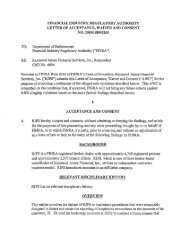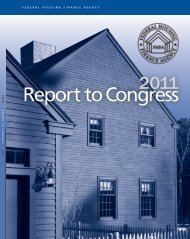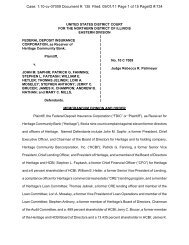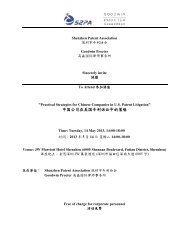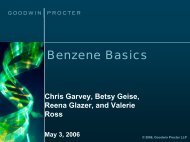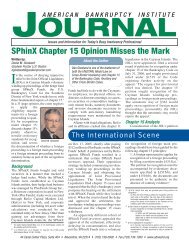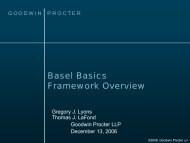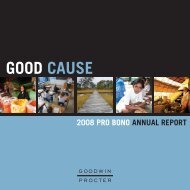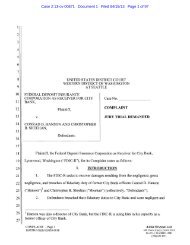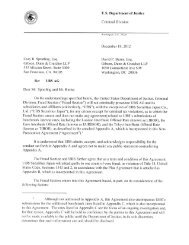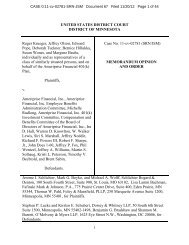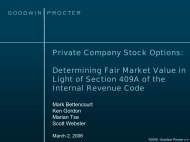Here - Goodwin Procter LLP
Here - Goodwin Procter LLP
Here - Goodwin Procter LLP
You also want an ePaper? Increase the reach of your titles
YUMPU automatically turns print PDFs into web optimized ePapers that Google loves.
CHAPTER 9 VS. CHAPTER 11: A SUMMARY OF KEY DIFFERENCES<br />
By: Gina Martin<br />
In the last year, several municipalities, including Jefferson County, Alabama; Stockton, CA; San Bernardino, CA; and Central Falls, RI,<br />
have sought protection under Chapter 9 of the Bankruptcy Code. Chapter 9, enacted solely for municipalities, has many similarities to<br />
Chapter 11, enacted for corporations and individuals seeking to reorganize their debts. There are several key differences between<br />
Chapter 9 and Chapter 11. A brief summary of these differences is set forth below.<br />
Chapter 9 filings are still relatively rare. However, if you find yourself involved in a Chapter 9 case, it is important to recognize that the<br />
processes procedures and rights in Chapter 9 cases can vary significantly from Chapter 11 reorganizations.<br />
Bankruptcy Concept/<br />
Applicable Provision<br />
Voluntary/Involuntary Petition/ §303<br />
Eligibility/§109<br />
Use, Sale or Lease of Property §363<br />
Post-petition effect of security<br />
interest<br />
§ 552<br />
Recourse claims<br />
§1111/§927<br />
Retention of Professionals § 327<br />
Avoidance of Preferential Transfers<br />
§547/§926(b)<br />
Exclusivity to File a Plan<br />
§1121/§941<br />
Right to Reject Collective<br />
Bargaining Agreement<br />
§1113<br />
Payment of Insurance Benefits to<br />
Retired Employees<br />
§1114<br />
Priority Wage and Severance Claim<br />
§ 502(a)(4)<br />
Chapter 11 Chapter 9<br />
Involuntary or voluntary filing to commence<br />
case<br />
Generally, eligibility is not challenged in<br />
Chapter 11 as the party is presumed to be<br />
eligible to file (exceptions to eligibility include<br />
insurance companies, insured banks,<br />
stockbrokers and commodity brokers)<br />
Debtor cannot use, sell, or lease property<br />
outside of the ordinary course without<br />
bankruptcy court approval<br />
Property acquired by the estate or by the<br />
debtor after the commencement of a case is<br />
not subject to any lien resulting from a security<br />
agreement entered into pre-petition<br />
A claim secured by a lien on property of the<br />
estate is allowed pursuant to Section 502<br />
regardless of whether the holder of such claim<br />
had recourse against the debtor<br />
Bankruptcy Court approval is required to retain<br />
and pay professionals<br />
Payments to creditors on account of an<br />
antecedent debt made within 90 days of<br />
petition date (one year if an insider), while<br />
debtor is insolvent can be avoided by<br />
trustee/debtor-in-possession (subject to<br />
applicable defenses)<br />
Debtor has exclusive right to file a plan for first<br />
120 days of case (subject to termination or<br />
extension for cause)<br />
Limitations/protections regarding a debtor’s<br />
right to reject a collective bargaining agreement<br />
Section 1114 imposes certain requirements on<br />
a debtor seeking to modify retiree benefits<br />
Claims for wages, salaries, or commissions,<br />
including severance entitled to priority up to<br />
$11,725<br />
Must be voluntary<br />
A municipality must demonstrate that it is eligible to be a debtor<br />
pursuant to Section 109(c), including that it is insolvent; generally<br />
eligibility of a municipality to file for Chapter 9 protection is<br />
contested by one or more creditors<br />
Debtor can use, sell or lease its property without bankruptcy court<br />
oversight<br />
Pre-petition security interest in special revenue bonds retained<br />
post-petition (special revenue bonds are given greater protection<br />
in Chapter 9 than general obligation bonds)<br />
Special revenue bondholders do not have recourse against the<br />
debtor pursuant to §1111(b)<br />
Bankruptcy Court approval to retain and/or pay professionals is<br />
not required<br />
While preferential transfers can be avoided, there is an exception<br />
for payments or transfers of property made to bondholders<br />
Only debtor has right to file plan – no deadline unless Bankruptcy<br />
Court orders one<br />
No such limitations or protections. Section 1113 does not apply in<br />
Chapter 9<br />
No requirements imposed on a municipality. Section 1114 does<br />
not apply in Chapter 9<br />
No priority for wage claims. Section 507(a)(4) does not apply in<br />
Chapter 9<br />
FOR MORE ANALYSIS AND COMMENTARY VISIT MUNIBK at http://blog.munibk.com/



